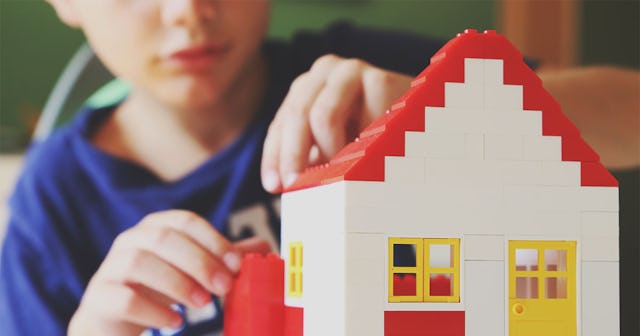Why I'm Worried About My 6-Year-Old's Mental Health

“Ok, this is gross.” I pulled a brown banana out of my son’s backpack. Like many of the healthy lunch options I pack, this one went for a ride to school, only to return home battered and uneaten.
I stood there for a moment, staring at the banana. Delirium from my lack of sleep took over: “I feel ya, buddy. We started the day with high hopes, but we took a beating and now we’re feeling bruised and defeated.”
Conversations with bananas aside, today was a hard mom day. We’re two months into my son Aidan’s first “normal” school year as a first grader, and he’s clearly struggling. He doesn’t share much, only passing comments about friendships crumbling and new classmates not wanting to play with him.
But his behavior says it all. He’s irritable, disrespectful, and at times withdrawn. There’s been a spike in slammed doors, eye rolls, and tears over the last few weeks, and it seems he’s pissed at me for my failure to protect him from the anxiety he’s feeling as he re-enters society. It’s tough being a kid in a post-pandemic world, though at times I wonder if it’s even tougher being a parent. I’m losing sleep worrying about my six-year-old’s mental health (hence my banter with a piece of fruit.)
Today his teacher called because there have been a few incidents that suggest his biggest challenges are social-emotional. I know we can’t possibly see around every corner for our kids, but I did not see this one coming. Even with all the studies and press about how pandemic isolation has impacted kids’ social skills, I naively considered mine untouchable.
But here we are, and I’m devastated for him.
These are the parenting moments when I have to fight my urge to scoop him up and assure him that I’m the only friend he needs. When I force myself to empty the cart full of toys that would only temporarily relieve his pain. When I remind myself that we’ve entered a phase that requires a plan more robust than going for ice cream after school.
This might be our first “big kid” problem, and it’s a doozy. Some might say these things tend to work themselves out, but I know first-hand childhood anxiety is real and I won’t leave him flailing without any support. He deserves to experience the idyllic blend of resilience and carefree that makes childhood so wonderful. Here’s my plan…
Listen — while playing it cool, of course.
My little man holds his feelings close to the vest, so I don’t get a desired response with a simple “how was school today?” But I’ve realized there are golden moments during bedtime, car rides, and random lulls in the day when he inadvertently opens up to me. Any inkling that I’m concerned or surprised and he’ll immediately clam up, so I’m sure not to act as though I’m hanging on his every word. I play it cool and give him my casual-yet-undivided attention for as long as I possibly can… or until he abruptly turns the conversation back to LEGOS or Minecraft.
Avoid the urge to return to normal.
I have this nagging notion that our goal is to catch up to the other kids or close some sort of social gap. As moms, we’re fixers, but this is a delicate situation presenting itself during unprecedented times. Aidan completed kindergarten on an iPad; he doesn’t know normal. He just knows something hurts. And though my heart sinks when I see his classmates effortlessly playing together, I remember to keep my eyes on the prize: getting him to a place where he feels loved and accepted being himself. At that point I’ll consider him “caught up.”
Talk about feelings.
Big sigh. Deep eye roll…I can write about my feelings all day long, but it’s draining for me to talk about them. Now I have a son who needs practice identifying and managing his emotions, so it’s time to put on the big girl pants and model healthy behavior. I share simple examples of instances when something disappointed me or I didn’t get the outcome I wanted, how it made me feel, and what I did in response. To be honest, it appears to fall on deaf ears. My hope is that he’s absorbing more than he lets on, so I persist.
Tap into the social emotional resources at school.
Thankfully, times have changed since I was a kid and academics aren’t the sole focus of an elementary school curriculum. Our schools have programs in place to help students build their post pandemic resilience and social skills. I’m so grateful that feeling connected, safe, and secure is priority above academics.
Adopt “scaffold parenting”.
In my online soul searching, I came across a beautiful concept called scaffold parenting. The metaphor is that the child is the “building,” and the parents are the scaffold around it; the framework that guides and protects as the child rises and grows. This means accepting that I can’t put a band-aid on social rejection, bullying, or anxiety. Aidan needs to spread his wings, make mistakes, and get hurt as he re-engages with the world. What I can do is build a loving structure around him so he can grow into a resilient, confident, and happy kid.
People need social connection at every stage of life, and it makes sense that young children who have only just begun to learn basic social skills are floundering after a year of isolation. But man, for every two steps forward, we take one step back. Such is the life of a parent. This too shall pass, and my response to Aidan’s adversity is just an opportunity to model resilience. In the meantime, I shall talk to fruit.